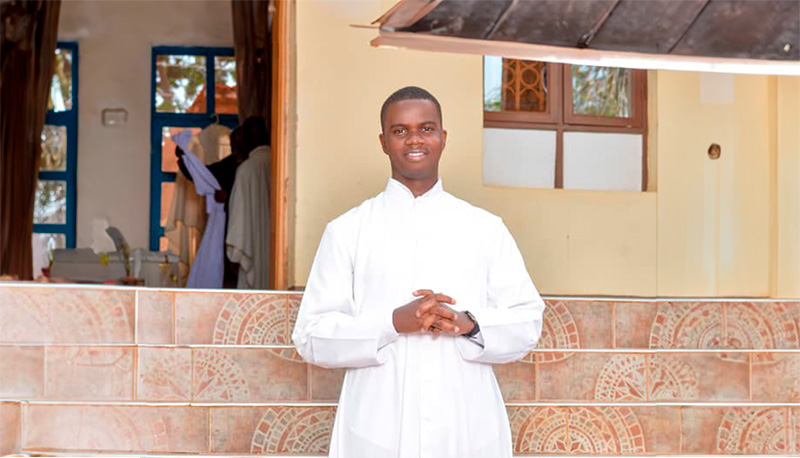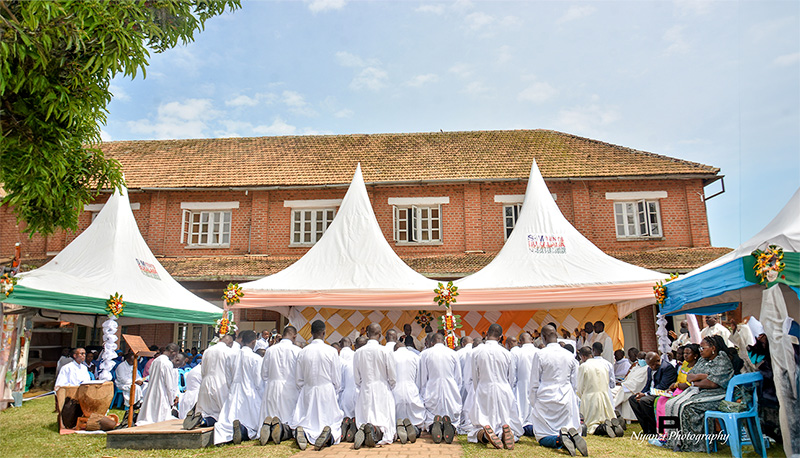
Johnmary Mayanja Jjemba is a seminarian from the diocese of Kampala (Uganda). He is 25 years old and has been studying for two years to become a priest in the Bidasoa International Seminar in Pamplona. He learned everything from his family, because as he says "we are from the family rather than living in community and going to church". The family is at the root of almost everything we do and the first seedbed of priestly vocations.
A large Catholic family
His father, a journalist, and his mother, a housewife, raised a family of seven children: four boys and three girls. A Catholic and large family. And when he arrived in Spain, he noticed that some people he met looked at him with surprise, as if to say: being a large family in Uganda is suicide.
Johnmary acknowledges that not everything is perfect in such a large family.that there are times when economic needs are urgent and that not everything is available. On the other hand, one learns to respect the parents' decision to give each child what he or she needs at that moment. But he, despite the difficulties, prefers a large family. Because what you learn is more valuable than material needs: you live true family life, you leave your personal tastes behind, you learn to seek the common good.
A numerous family brings the richness of learning to live together, tolerate each other's differences, work as a team and help those who need support.
All this life experience has left its mark on him during his time as a seminarian: he knows what it means to give himself to others, living in community with other peersand to understand in the future, when I will be a priest, God willing, the concerns of the faithful.
One of the main characteristics of a priest in Uganda is that he has to strengthen the women and men in the community. families. Children must learn the faith at home. For Johnmary this is the key to evangelization in his country. In this way, even if young people abandon the faith at some point, it will be easier for them to return to the Church. This young Ugandan seminarian says that, in his country, the parish priests and chaplains have driven many youth movements such as Y.C.S., Youth Alive and Focolare, which help young people strengthen their faith through sports and craft activities, choirs, conferences, drama or theater classes, etc.
But in order to reach families, young people and the faithful, Johnmary is aware that a priest must be well preparedwhether in Africa or Europe: Jesus Christ is the same there as here. "He saved us and the seminarians must learn and serve as the High Priest. The challenges of this generation need not worry us because we have the almighty Savior and the intercession of the Virgin Mary."

At the age of 14, his father sent him to study at the minor seminary of St. Gabriel and St. Joseph in Nswanjere, 32 kilometers from Kampala. He did not enter the seminary to become a seminarian, but to study. The school was good and so his father decided. Because Johnmary had no intention of becoming a priest.
But after a year, God made him see that He wanted him for Himself, that being a priest was his vocation. One of his younger brothers has followed him on the same path and is also a priest. seminarian. His name is Victor and he is in the major seminary in Uganda where he studied Johnmary.
He is still a young seminarian, but the needs of his country are pressing him. Uganda has few priests for the evangelization. He is saddened that in many parishes it is only possible to celebrate mass The fact that there are not enough structures, that the faithful do not have churches where they can pray, that there are villages without temples.
Uganda is land of martyrsmartyrs who have poured out their faith for Christ. And the faithful of Uganda follow the example of their martyrs. They venerate them.
In addition to this inheritance of faith and martyrdom left by their predecessorsJohnmary insists that evangelization in his country goes through families. It is the fruit of families, because transmitting the faith from childhood, respecting other religions and knowing how to live with people who do not think like you, is learned in the family.
Marta Santín, Journalist specializing in religious information